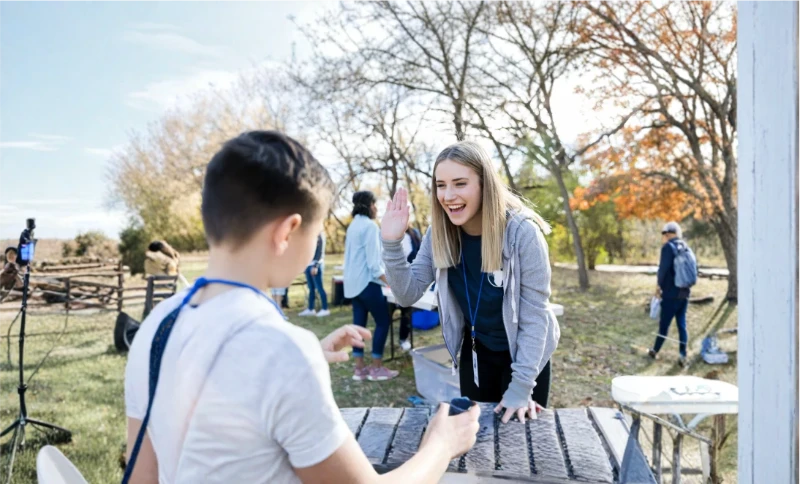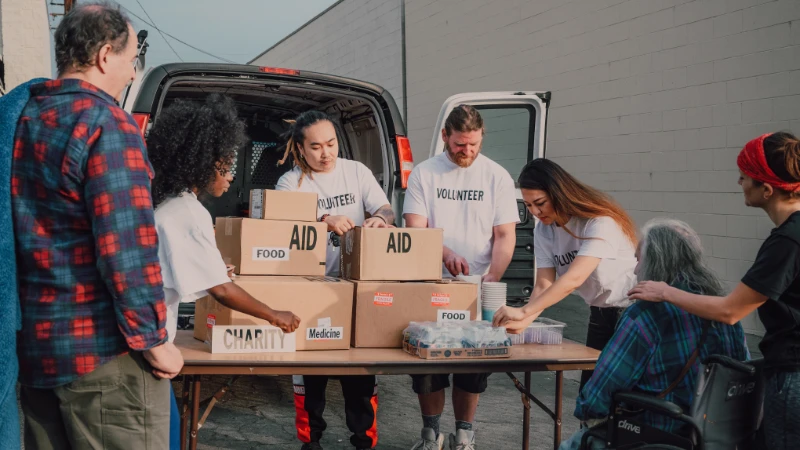Online Youth Work Courses
Where Can Youth Work Take You?
Youth Work Online Courses develop your practical skills in communication, engaging respectfully with young people, cultural safety, and responding to risk. You will learn to deliver safe, ethical support across youth settings, ready for real workplace outcomes.

Overview
Career Outcomes
What careers could you be open to after studying this course?

Youth Worker
Average salary: AU$75,000 to 85,000 per year.*
Supporting and mentoring young people to thrive by helping them navigate personal, social, and emotional challenges.

Youth Outreach Worker
Average salary: AU$75,000 to 95,000 per year.*
Engaging with young people through youth engagement and out-of-service outreach, offering support, referrals, and crisis help.

Community Development Manager
Average salary: AU$80,000 to $100,000 per year*
Engages with communities to assess needs, design programs, and support initiatives that strengthen social participation and wellbeing.

Youth Program Manager
Average salary: AU$95,000 per year.*
Oversees and leads youth programs, managing staff, budgets, and strategy to deliver meaningful outcomes.

Child Protection Worker
Average salary: AU$80,000 per year.*
Safeguarding vulnerable children and ensuring their safety by assessing risk and working with families to create safer environments.

Addiction Counsellor
Average salary: AU$79,000 to 103,000 per year*
Providing counselling and rehabilitation support to individuals struggling with drug or alcohol dependency, helping them rebuild their lives.
Youth Work in Australia
Working in youth services is more than a job. It is a career built on real impact. Every decision, every program, and every conversation has the power to shape a young person’s future.
The demand for skilled youth professionals continues to rise, and the numbers prove it:
- There are about 16,200 Youth Workers currently employed in Australia, showing that the youth work field is real, recognised, and steadily growing (Jobs and Skills Australia, 2025).
- More than 8,645 Youth Worker roles are currently open across Australia, highlighting strong employment opportunities in community and social services (Seek, 2025).
- 59% percent of Youth Workers are female, reflecting a diverse and inclusive workforce that welcomes people from all backgrounds (Jobs and Skills Australia, 2025).
Each of these figures shows that youth work is growing, inclusive, and essential to building stronger communities across Australia.
When you study youth work, you do more than learn theory. You prepare for a career that turns statistics into stories of success. You will learn how to navigate social systems, trauma, and community dynamics, empowering you to create transformation where it is needed most.

What Makes Studying With Us Unique
⭐ Empower Communities – Learn to develop programs that build resilience, inclusion, and opportunity for young people.
⭐ Practical, Job-Ready Skills – Apply theory to real scenarios through 80 hours of work placement, gaining hands-on experience in community settings.
⭐ Expert Mentorship – Learn from trainers who’ve worked in youth services, mental health, and justice support; professionals who’ve walked the path you’re about to take.
⭐ Flexible Learning – Study online, with live evening Zoom classes, 1:1 trainer support, and flexible payment plans starting from $34 per week.

Skills You’ll Develop
Our nationally recognised qualifications in Youth Work equip you with the practical skills and theoretical knowledge to create meaningful change within youth and community services.
Throughout these programs, you will develop expertise and hands-on abilities in:
- Youth Engagement and Communication - Build strong relationships with young people through clear communication and active listening.
- Crisis and Risk Management - Respond calmly and effectively to crises while ensuring safety and support.
- Program Design and Facilitation - Create and deliver programs that build connection, resilience, and community engagement.
- Trauma-Informed and Mental Health Support - Support young people using trauma-aware and mental health care practices.
- Cultural Safety and Inclusion - Promote inclusion and cultural safety for Aboriginal and Torres Strait Islander communities.
- Ethical and Legal Practice - Follow ethical standards and legal frameworks to ensure safe and professional youth work.
These essential skill areas prepare you to step into the youth work field with confidence, deliver real results, and build a purposeful, rewarding career helping others thrive.

Find the Right Path for You
If you are ready to make a difference and build a career that matters, Hader Institute of Education offers three flexible study options that empower you to create real change in your community.
The Youth Work Short Course is an excellent starting point to explore the field, learn the fundamentals, and discover your passion for helping others. For those ready to advance their skills and make a real impact, the CHC42021 Certificate IV in Youth Work is the most empowering choice, offering national recognition, hands-on experience, and professional credibility. The CHC50421 Diploma of Youth Work takes you even further, building advanced leadership, coordination, and management expertise to shape meaningful change in youth and community services.
Each qualification builds on the one before it, guiding you from exploration to professional recognition and leadership within Australia’s growing youth and community services sector.

Youth Activity Coordinator
Community Support Assistant
Volunteer Program Worker
Entry-Level Youth Support Officer
Youth Justice Officer
Community Development Worker
Addiction Counsellor
Child Protection Worker
Case Manager or Support Coordinator
Youth Outreach Specialist
Youth and Family Services Coordinator
Community Development Manager
Youth Housing or Mental Health Manager
Youth Services Leader
(AQF Level 4)
(AQF Level 5)
Residential Support Worker
Assistant Community Development Officer
Youth Worker
Mental Health Support Worker
Domestic Violence Worker
Case Worker Community Services
Outreach Officer
Welfare Support Worker
Health Education Officer
Community Legal Officer
Welfare Rights Worker
Care Team Leader
Family Support Worker
Housing Manager
Community Services Coordinator
Family Support Worker
Community Development Officer
Community Engagement Officer
(AQF Level 4)
(AQF Level 5)
Community Support Worker
Peer Support Worker
Mental Health Outreach Worker
Community Support Worker
Mental Health Intake Officer
Mental Health Outreach Worker
Mental Health Rehabilitation Support Worker
Mental Health Services
Rehabilitation Counsellor
Community Rehabilitation and Support Worker
Mental Health Outreach Worker
Mental Health Rehabilitation Support Worker
(AQF Level 4)
(AQF Level 5)
Community Support Worker
Outreach Worker
Mental Health Support Worker
Crisis Intervention Support
Detoxification Support Worker
Case Worker
Community Outreach Officer
Wellbeing Support Worker
Advocacy and Support Assistant
Case Manager
Recovery Program Facilitator
Dual Diagnosis Practitioner
Community Program Coordinator
Wellbeing and Support Leader
Behavioural Support Officer
Client Liaison or Advocacy Assistant
Community Outreach or Social Services Officer
Forensic or Legal Administrative Support
Crime Scene Support Officer
Legal or Police Administrative Support
Intelligence Analyst (Entry-Level)
Journalism or Research Assistant
Legal or Police Administrative Support
Forensic Laboratory Assistant
Crime Scene Support Officer
Journalism or Research Assistant (crime and law reporting)
(AQF Level 4)
(AQF Level 4)
CHC43215 Certificate IV in Alcohol and Other Drugs with 12 core units and 3 elective units, delivered in a single integrated dual study plan.
CHC40421 Certificate IV in Youth Work with 15 core units and 2 elective units, combined into one coordinated dual program.
Community rehabilitation and support worker
Alcohol and drugs worker
Drug and alcohol counsellor
Detoxification worker
Mental health intake officer
Mental health outreach worker
Case worker
Youth outreach officer
Youth program facilitator
Community support worker
Case worker
Outreach officer
Information and referral worker
Welfare support worker
Ready to make a difference?
Start your journey in Youth Work with Hader Institute of Education, trusted by thousands across Australia. Build real-world skills, gain experience through supported placements, and step confidently into a career where you can make a difference in young people’s lives.

Frequently Asked Questions (FAQs)
What does Youth Work do and why is it important?
Youth work involves supporting young people as they navigate social, behavioural, emotional, and developmental challenges. It includes building trusted relationships, delivering tailored programs, and promoting wellbeing through advocacy, support, and skill-building.
Working in community, government, and welfare sectors, professionals help young people make positive decisions, and feel safe and supported in welcoming, inclusive environments. This role requires strong communication, cultural awareness, ethical practice, and a non-judgemental approach.
Are your youth work courses nationally recognised?
Yes! All Youth Work qualifications offered by Hader Institute of Education, including the Short Course, Certificate IV (CHC40421), and Diploma (CHC50421), are nationally recognised and accredited under the Australian Qualifications Framework (AQF).
Can I study youth work online in Australia?
Absolutely. All programs are delivered online using a flexible model that includes:
- Self-paced study modules
- Weekly Zoom classes
- Pre-recorded learning sessions
- Trainer support and real-world case studies
What are the entry requirements for a course in Youth Work?
To enrol, you must be at least 18 years old, have completed Year 12 or successfully completed a literacy and numeracy quiz, have basic computer skills, and have reliable internet access. Please refer to the specific qualification for full details.
What job opportunities are available after course completion?
Graduates may work in roles such as:
- Youth Support Worker
- Youth Outreach Worker
- Youth Mentor
- Community Support Worker
- Youth Activity Coordinator
Typical work settings include:
- Youth and community centres
- Outreach and support programs
- Residential youth services
- Not-for-profit organisations
- Government and welfare agencies
Does the course include any practical work placement?
Yes, work placement is required for:
- Certificate IV in Youth Work: 80 hours
- Diploma of Youth Work: 200 hours
Hader Institute of Education provides placement support, including supervision and progress tracking by a dedicated assessor.
How much can youth workers earn in Australia?
The average yearly salary is between $70,000 and $85,000.
What is a Certificate IV in Youth Work equivalent to?
The Certificate 4 Youth Work is generally accepted by Australian universities to be equivalent to the first 6 to 12 months of a bachelor’s degree.
Is a Certificate IV in Youth Work difficult?
A Certificate 4 Youth Work is challenging but achievable with the right support. Hader Institute of Education offers one-on-one support calls, regular check-ins, and access to expert trainers.
While the coursework requires commitment, our structured learning approach ensures students stay on track and receive personalised guidance throughout the child and youth welfare course.
How much does it cost to earn a Certificate IV in Youth Work?
Earning a CHC40421 Certificate IV in Youth Work costs as little as $48 per week under online courses with payment plans. Hader Institute of Education’s 12-month online course offers flexible payment options to suit different budgets, including:
- Interest-free Study Now, Pay Later (via PayRight or Elevant)
- Upfront payments (via EFT or credit card)
- Weekly or fortnightly plans (via Student Pay or Debit Success)
Informative Insights About A Certificate 4 Youth Work Qualification
The Certificate 4 Youth Work is a practical first step towards making a lasting impact in the lives of young people.
At Hader Institute of Education, our nationally recognised youth work certificate equips you with the tools to support youth through complex challenges, whether they’re dealing with mental health concerns, social barriers, or transitions in life. You’ll build the skills to connect with young people and respond to their individual needs with care, empathy, and professionalism.
If you’re considering this path, here are some informative insights about the Certificate 4 Youth Work.
Insight #1: Not all online learning options are created equal.
Choosing an accredited youth career course is vital.
At Hader Institute of Education, we offer the CHC40421 Certificate IV in Youth Work, which is nationally recognised youth work training across the country. Meeting Australian industry standards, each class is designed to maintain a high level of quality and relevance. When you enrol at Hader Institute of Education, you join a community focused on social change and empowering young people.
Our passionate trainers and subject matter experts are committed to guiding you towards success, no matter when you decide to get started learning how to become a youth worker.
The experience offers flexibility and practical support.
Balancing online learning for youth work with a busy life can be a challenge. That’s why our program offers flexibility with online modules that you can complete at your own pace, ensuring your studies fit seamlessly around your work, family, and other commitments.
To make things more interactive and supportive as you study youth work online, we provide weekly live Zoom sessions and one-on-one mentoring opportunities, all facilitated by skilled trainers. Plus, our user-friendly platform is designed for practical application, providing assessments that relate directly to the real world so you can graduate empowered and ready to start a career in youth work.
Insight #2: You need to sharpen soft skills and practical readiness to thrive.
Empathy, resilience, and effective communication are at the heart of youth work. Building trust is an essential skill you develop with online study courses. It involves listening with an open mind and being present for young people facing challenges.
At Hader Institute of Education, you can enhance your patience, cultural sensitivity, and advocacy skills, which are all traits employers highly value in this industry. You’ll also learn to create safe spaces where honest conversations can happen, support positive decision-making, and guide youth towards their full potential.
There are entry requirements to set you up for success.
To enrol, you’ll need to:
- Be at least 18 years old
- Be an Australian citizen or permanent resident
- Have completed either Year 12 or equivalent or an Australian Qualifications Framework (AQF) Certificate IV qualification
- Complete a short online LLN assessment
To participate fully in the course, you’ll need:
- The ability to complete 80 hours of work placement in a suitable health facility
- A Working with Children Check, a Police Check, and any required immunisations before placement begins (where applicable)
- Access to a computer with a reliable internet connection
- Basic computer skills to use our online platform and use Word features for your assessments in your online course of study
Insight #3: This qualification offers diverse roles and meaningful youth impact.
The Certificate 4 Youth Work opens many doors. You can pursue roles like:
- Youth Worker
- Youth Outreach Worker
- Addiction Counsellor
- Mental Health Support Worker
- Case Worker
- Disability Support Worker
These positions differ in responsibilities but all share the common goal of empowering individuals and communities. You may also find a career in youth services as a child protection worker, youth justice officer, support worker, or youth mentor.
Once you get qualified for youth work, you can work in various real-world settings, such as:
- Schools
- Community centres
- Youth outreach organisations
- Shelters
- Mental health services
- Not-for-profit agencies
Insight #4: Recognition of prior learning can make your experience efficient.
You may already have skills or qualifications that count towards your goal.
If you have work, volunteer, or life experience in youth-focused community services, you may be eligible for Recognition of Prior Learning (RPL). Our assessors review your existing evidence, such as job records or supervisor reports, so you can avoid repeating what you already know.
Credit transfer is also available for units completed through another Australian RTO, helping you stay on track and avoid unnecessary duplication during your 12-month online youth support course.
There are other learning pathways if you’re getting started or want to advance further.
Our Youth Work Short Course is a 12-week, self-paced program that introduces key skills in youth work, cultural safety, and community engagement. Short courses online are ideal for newcomers, professionals upskilling, or anyone wanting to explore the field before committing further.
Completed units can be credited towards the Certificate 4 Youth Work, and a statement of attainment provides formal recognition for future study or entry-level roles.
Once you’re ready to take the next step in your youth services training, you can check out the CHC50421 Diploma of Youth Work. Over 18 months of flexible, blended learning, you’ll gain the skills to design youth programmes, support complex needs, and move into senior roles like Youth Program Manager.
Build a meaningful future through education that supports you.
At Hader Institute of Education, we help turn your potential into real opportunities through flexible, online learning designed for your success. Whether you’re looking to get the Certificate 4 Youth Work or another one of our nationally recognised qualifications in fields like Mental Health or Community Services, our courses give you the skills to make a genuine impact.
Whether you want to get a Certificate IV or a diploma in youth work online, you’ll be in good hands. Start your online learning journey with us today.
Not sure which course is for you?
Take this short quiz for a course guide.
What our students say about us

Steven Dodman

Kara Galea

Kimmi Ryan

Beebree Shilling

Kayleen Clayton

Daine Spencer

Tide martino

RAINA. T



